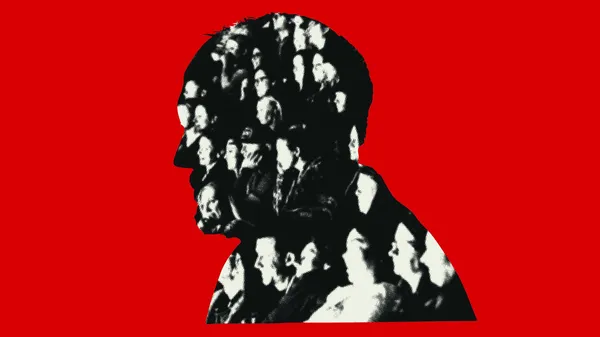Eye For Film >> Movies >> Sorry/Not Sorry (2023) Film Review
Sorry/Not Sorry
Reviewed by: Jennie Kermode

Early on in Cara Mones and Caroline Suh’s documentary about Louis CK, we see the man himself onstage, talking about peanut allergies. The audience, aware of the dare, perhaps buying into the tired old line that one could be arrested and taken to jail for saying the same in day to day life, laughs in relief as he suggests that maybe people with such allergies were not meant to live. What is palpably missing, however, is the corollary. If all you can do is try to shock by repeating, whilst middle class and on a stage, remarks one sees a dozen times a day on the internet, maybe you were not meant to be a comedian.
What is comedy? Jokes, wit, humour, shaggy dog stories – all these things have their place, though they are less and less visible in the big bucks world of stadium gigs and Netflix specials. It has often been said that the crux of what makes a comedian appealing, at least in the absence of those things, is aggression. It’s a power game. In that environment, people who start out with power have a distinct advantage. “Most female comedians quit because it’s just a series of indignities they have to suffer all their lives just to get 50% of what men get,” says Megan Koester – and some of those indignities, of course, were occasioned by CK.
There is no dispute about this. He has owned up to his actions. He has, indeed, endeavoured to make comedy out of them, talking about how terrible men are, noting that he’s one of them, getting praised for his honesty as a result. Again, there’s something missing: any sense of responsibility. It’s not that his remarks have any depth or sophistication: the delight they create in a certain section of the population stems from the fact that they do not incur the obvious response (if all men were really like that, it would make sense to lock them up, maim or kill them, Valerie Solanas-style), and they thereby serve as a reminder of male power, of impunity, at least within the boundaries of this domain.
One of a series of films about ‘cancel culture’ which screened at the 2024 Glasgow Film Festival, Sorry/Not Sorry, which takes the first part of its title from that of CK’s comeback show, tells the story behind CK’s troubling behaviours and explores the wider sociological issues relating to them. Taking a rather more balanced approach than those strutting their stuff onstage, Mones and Suh make room for a variety of opinions. There is no shortage of apologism to be found amongst CK’s fans. He said sorry, they observe. What else is he supposed to do? Which would be fine, insofar as it goes, except that they then expect everything to go back to the way it was before, as if the harm done will just magically go away.
There are complex questions around that harm, and it’s certainly not all CK’s fault. The hate messages and threats with which the women who spoke up have been bombarded ever since (there’s no dispute about these either – you can go on social media and see for yourself) stem from that wider community, and it’s the focus on the community that constitutes the real meat of this film.
CK says that he didn’t mean any harm when masturbating in front of various women – that he asked for their consent first. It’s possible that he genuinely lacked the self awareness to understand that they might not take him seriously until he actually did it, that they might be frozen with shock, or that the power imbalance involved (they were up-and-coming performers, he was a well-connected star) might make them afraid to say no. It seems not unreasonable, however, to imagine that some of the people around him must have figured out that it was problematic – and there’s no indication that any of them tried to intervene. In this light, that apologism smacks of facilitation, something which happens in all sorts of communities with all sorts of problematic people, giving the film much wider relevance.
Emerging into public discourse shortly after the Weinstein and Cosby scandals, the furore over CK’s behaviour was always going to be subject to social and political distortions. Women and others with experience of such mistreatment were angry and also hopeful about the possibility of social change, but there was also a backlash underway as those with entrenched power sought to defend the status quo. Because they were less egregious than the actions of the aforementioned men, CK’s actions were trivialised by many. By taking their time and standing back from the fray, Mones and Suh are able to take a much more objective look at these social phenomena.
Central to the film is an extensive interview with Jen Kirkman, the first of the women to speak up about CK. It takes a particular kind of courage to return to this subject after receiving so much abuse, and it’s valuable to hear her explain why she made the choices she did (including, at one point, trying to withdraw her claims, because she just wanted everything to go back to normal). Like others in her trade, she has natural charisma, and is at times entertaining to watch, helping to keep the film from becoming too depressing. Other women also, more briefly, discuss their experiences with CK, and there are also interviews with men in the business, one of whom makes the salient but often overlooked point that protecting or rehabilitating men like CK means that other people’s talents are sidelined or lost altogether. The problem with consequence-free speech is that all too often it drowns out the voices of others.
There is a general feeling, now, that the initial force of the #MeToo movement has dissipated, that things are returning to the way they were before, as they have done with every previous attempt to bring about change. This film, however, highlights the subtler cultural shifts taking place in the aftermath of all that headline-grabbing fury. It illustrates the ongoing struggles taking place at what may yet prove to be a pivotal moment in history, when entrenched power is threatened like never before. Things are likely to get uglier before they get better, from any perspective, but it remains to be seen who will have the last laugh.
Reviewed on: 30 Mar 2024
















